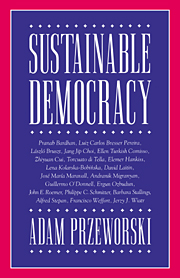Book contents
- Frontmatter
- Contents
- Preface
- Acknowledgments
- Introduction
- PART I DEMOCRACY AND DEMOCRATIC INSTITUTIONS
- 1 Transitions to Democracy and Territorial Integrity
- 2 Democracy, Citizenship, and the State
- 3 Democratic Institutions
- 4 Civil Society
- PART II MARKETS, PROPERTY SYSTEMS, AND ECONOMIC GROWTH
- Conclusion
- Notes
- References
- East-South Systems Transformations Working Papers
- About the Authors
- Author Index
- Subject Index
1 - Transitions to Democracy and Territorial Integrity
Published online by Cambridge University Press: 05 May 2010
- Frontmatter
- Contents
- Preface
- Acknowledgments
- Introduction
- PART I DEMOCRACY AND DEMOCRATIC INSTITUTIONS
- 1 Transitions to Democracy and Territorial Integrity
- 2 Democracy, Citizenship, and the State
- 3 Democratic Institutions
- 4 Civil Society
- PART II MARKETS, PROPERTY SYSTEMS, AND ECONOMIC GROWTH
- Conclusion
- Notes
- References
- East-South Systems Transformations Working Papers
- About the Authors
- Author Index
- Subject Index
Summary
Democratization is often considered inherently more difficult in multinational states than in polities in which all people see themselves as members of the same community. Under conditions of shared membership, it is presumed, the principle of shared institutions is not contested; the only issue is the structure of the institutions that are to be shared. The classic statement of this view is that of John Stuart Mill, who in his Considerations on Representative Government (1958: 230) argued: “Free institutions are next to impossible in a country made up of different nationalities. Among a people without fellow-feeling, especially if they read and speak different languages, the united public opinion, necessary to the working of representative government, cannot exist.” Similarly, Robert Dahl (1971: 110-111) reasoned that nationality differences within states restricted participation for some citizens, thereby limiting the possibility for a successful polyarchy. His empirical data gave support to his reasoning; among 114 polities, 58 percent with a low degree of subcultural pluralism, 36 percent with moderate pluralism, and only 15 percent with marked pluralism were poly archies, or nearly so.
Alvin Rabushka and Kenneth Shepsle (1972) provided microfoundations for these views. They argued that in plural societies political entrepreneurs, through the use of ambiguity, can win votes among all ethnic groups. Politicians who give ambiguous messages are in essence offering the voters a lottery.
- Type
- Chapter
- Information
- Sustainable Democracy , pp. 19 - 33Publisher: Cambridge University PressPrint publication year: 1995



